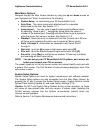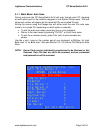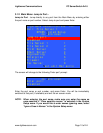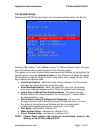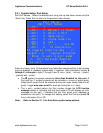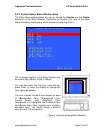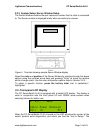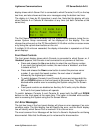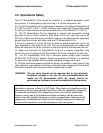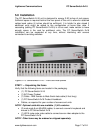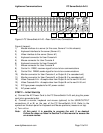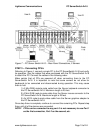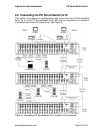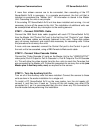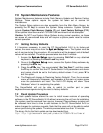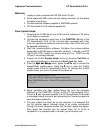
Lightwave Communications PC ServerSwitch 2x16
www.lightwavecom.com Page 16 of 24
4.0 Operational Safety
The PC ServerSwitch 2x16 should be installed in a suitable equipment room
environment. It is designed for rack mounting in a 19-inch equipment rack.
A) The PC ServerSwitch 2x16 is designed to operate in an ambient temperature of
0°C (32°F) to 50°C (122°F), 10-90% humidity, non-condensing. Ensure that closed
or multi-unit racks maintain an ambient temperature not to exceed 50 °C (122 °F).
B) The PC ServerSwitch 2x16 is designed to operate with convection cooling
provided by the air holes located in both sides of the unit. Heat flow rate is 82
BTU/hour. Make sure that these ventilation holes are not obstructed by equipment
placed directly in contact with either side of a PC ServerSwitch 2x16.
If the unit is placed on a shelf, be sure to allow air space around the unit for air
flow, especially to the sides of the unit. The unit is shipped with four rubber feet
which will raise the unit off of a counter or shelf and allow air flow beneath the unit.
C) Make sure that each PC ServerSwitch 2x16 unit is properly supported in the
front of the unit, by bolting the PC ServerSwitch 2x16 into a standard 19 inch rack.
D) The PC ServerSwitch 2x16 has a universal power supply which requires
85-264 VAC, 47-63 Hz at 1 ampere. Power consumption is 24 watts. It is important
for each unit to be supplied with the proper operating voltage and current.
E) All rack mounted equipment should be reliably connected to earth ground. Pay
close attention to grounding at all times, particularly when equipment is not directly
connected to power mains (such as when a power strip is used).
WARNING: The top cover should not be removed due to the potentially
hazardous voltages in the unit. No user serviceable parts are
inside the PC ServerSwitch 2x16. All repairs should be
performed by Lightwave to avoid cancellation of the warranty.
Note: This equipment has been tested and found to comply with the limits for a Class A
digital device, pursuant to Part 15 of FCC Rules. These limits are designed to provide a
reasonable protection against harmful interference when the equipment is operated in
a commercial environment. This equipment generates, uses and can radiate radio
frequency energy and, if not installed and used in accordance with the instruction
manual, may cause harmful interference to radio communications. Operation of this
equipment in a residential area is likely to cause harmful interference in which case
the user will be required to correct the interference at his own expense.



